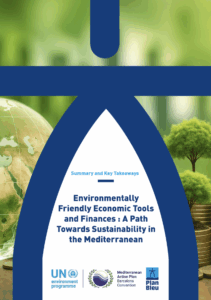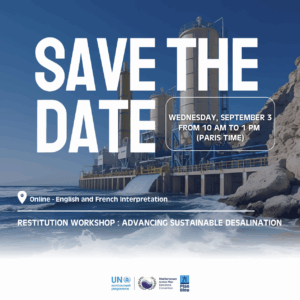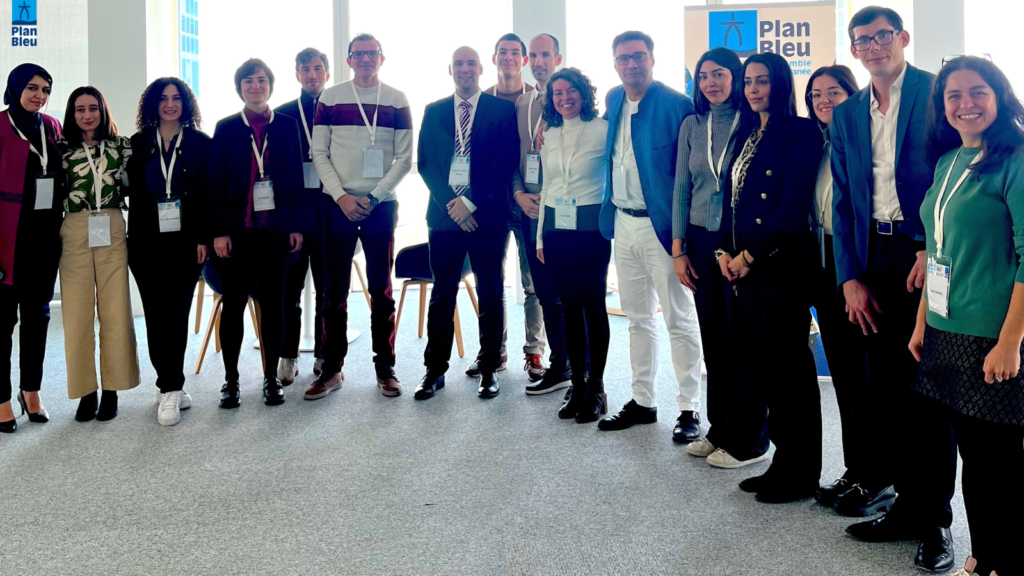Plan Bleu organized the workshop “Harmful subsidies and the Mediterranean: Balancing environmental sustainability, economy and equity” on January 30, 2024 in Marseille, within its office at Tour La Marseillaise.
The workshop led and organized by our Plan Bleu expert Constantin Tsakas brought together 16 experts from both shores of the Mediterranean. Organized in a hybrid format, 120 people also registered online to discuss together subsidies that are harmful to the environment. They constitute a major global concern, affecting the earth ecological balance. These government financial incentives intended to support the economy often have unintended ecological consequences. This issue is of particular importance for Mediterranean countries, a region rich in biodiversity, with delicate marine ecosystems and a crucial role in climate regulation. To answer, Plan Bleu launched a call and the experts present at this workshop came to present their work on this subject. If you were unable to attend the event, you will find here the transcribed summary of the workshop. Opened by President Guillaume Sainteny, on the ambition of Plan Beu to develop regular knowledge on the issues of “environmentally harmful subsidies in the Mediterranean”, the workshop took place over a whole day and allowed the authors to present their preliminary work of the 8 Policy Papers :
Session 1: Sectoral perspectives: Fisheries, Tourism
- Fishing subsidies and their impacts on marine ecosystems in Türkiye: The past, present and future (Nazli Demirel, Pinar Ertör-Akyazı, Taner Yıldız) » : This paper examines the impact of fishing subsidies on Türkiye’s marine ecosystems, particularly focusing on identifying those contributing to overfishing and unsustainable practices. The study addresses a crucial knowledge gap in Mediterranean regions, providing unique insights into the complexities of the Turkish fisheries sector. Using ecological indicators, a comprehensive review of subsidies, and data from the OECD’s Fisheries Support Dataset and the Global Fishing Watch database, the paper concludes with targeted policy recommendations for Turkey. These include the rationalization of subsidies, promotion of sustainable support mechanisms, eco-friendly fishing practices, support for fishing communities, and the establishment of continuous oversight and evaluation mechanisms, aligning with broader Mediterranean ecological and socio-economic objectives.
- The antagonistic effects of tourism industry strategies on land use management: A comparative analysis of Toulon (France) and Kusadasi (Turkey) (Vincent Monier et Myriam Ben Saad) : Paper highlights the impact of two tourism policies, both using geographical and economic approaches. Our findings show that in Toulon, a local land management strategy has enabled the conservation of environmental amenities, while seeing an increase in visitor numbers and revenue. While, in Kusadasi, the government’s strategic development plan for Turkey, has seen the coastline concreted over and coastal agriculture almost wiped out in favor of mass tourism, coming mainly from international travelers and tour operators. By looking back at the development of local tourism in these two areas, the aim of this article is to show how the same sector of activity – tourism – can produce different environmental risks.
Session 2: Sector Outlook: Energy
- Addressing The Link Between Fossil Fuel Subsidies And Climate Change In The Mediterranean Region(Sevil Acar) : This paper addresses the limited exploration of the economic impact of fossil fuel subsidies (FFS) on carbon dioxide (CO2) emissions in the Mediterranean, as several countries persist in supporting the sector through state incentives. The research utilizes the OECD inventory on FFS and examines whether these subsidies impede the transition to a low-carbon economy It also quantifies coal subsidies in Turkey, and offers valuable insights for policymakers in the region, guiding them in refining policy tools to support the transition toward renewable energy and climate change mitigation. It also quantifies coal subsidies in Turkey, and offers valuable insights for policymakers in the region, guiding them in refining policy tools to support the transition toward renewable energy and climate change mitigation.
- Female labor inclusion and energy policies in the Mediterranean countries: Evidence from a mixed methodology approach (Stella Tsani, Chrysoula Chitou, Karine Moukaddem, Valentina Dedi) : This paper explores the interplay between energy policies and female employment in the Mediterranean region, emphasizing subsidies and local job initiatives. Employing a three-step methodology involving literature review, empirical assessment, and a case study in Greece, the research uncovers a knowledge gap regarding the connection between energy subsidies and female employment in the region. Results clearly suggest that these subsidies amplify gender disparities within the energy workforce and that there is urgency of reassessing energy subsidy strategies in the Mediterranean.
Session 3: Special focus: Water-energy nexus in Algeria
- Fueling Algeria’s Future: Measuring the Footprint of Fossil Fuel Subsidies on The National Duality of “Water Stress-Energy Consumption” (Hadjer Boulila) : This policy paper addresses the urgent need to evaluate the impact of harmful subsidies on the environment and socio-economic conditions in southern Mediterranean countries, focusing on Algeria. It examines how government subsidies on fossil fuel production affect water scarcity and local energy consumption, showing significant influence of these subsidies on both. The research aims to provide the Algerian government with informed decision-making strategies and provides recommendations for a gradual reform, encouraging a smooth implementation of new incentives also taking into account social dimensions.
- Water Subsidies, Desalination, and Sustainable Resource Management: Policy Evidence from Algeria (Myriam Ben Saad, Rym Ben Saad, Mourad Kertous et Samir Baha-Eddine Maliki) : Water desalination is an energy-intensive process, and its sustainability is influenced by energy subsidies and policies in Mediterranean countries. This study focuses on the case of Algeria, analyzing the impact of water subsidies on the long-term viability of desalination. Limited analytical studies on Algeria exist, prompting a methodology concentrating on recent water regulations, desalination plant construction choices, and domestic natural gas consumption trends. Data from the World Bank, International Atomic Energy Agency, and Algeria’s energy usage are analyzed, cross-referenced with scenarios affecting subsidy policies and water prices. Results offer governance insights for decision-makers and shed light on the role of an energy-producing nation in supporting economic growth amid climate change challenges. Preliminary data suggests international mitigation actions will be crucial.
Session 4: Legal and monitoring perspectives
- Tax incentives and Energy Transition from a Legal Point of View: Analysis of Best Practices Adapted to the Decarbonisation of the Mediterranean Region (Merve Ergun) : This policy paper delves into the critical intersection of energy and taxation. Focused on the Mediterranean Region, the study explores the effective utilization of fiscal policies to expedite the energy transition process, with a particular emphasis on the decarbonization of the electricity supply industry (ESI). By considering both the international legal framework and EU legislation, the paper addresses the intricate balance required for implementing efficient and effective policies. The paper stresses the importance of considering incentive effects and proportionality in designing fiscal mechanisms. It also distinguishes between best and worst practices, emphasizing the need for simplicity in aid mechanisms.
- Measuring Progress and Accountability in Phasing Out Environmental Harmful Subsidies: A Comprehensive Framework for the Mediterranean region (Jeremie Fosse & Roberta Milo) ; This paper aims at providing a comprehensive framework for monitoring, assessing, and ensuring accountability in the process of phasing out environmental harmful subsidies (EHS). The proposed framework, namely the Euro-Mediterranean EHS Phase-Out and Reform Framework (EHS-MedFRAME), suggests key indicators and accountability mechanisms to effectively undertake EHS reform in the region. This common framework is designed to streamline the subsidy reform process, offering policymakers a standardized toolkit for measuring progress. The adoption of accountability mechanisms is also recommended to enhance transparency and effective execution of EHS reform. The deployment of the EHS-MedFRAME is expected to encourage regional cooperation and dialogue on the phase-out of EHS, as well as increasing accountability within the Euro-Mediterranean region.
Degron Robin, Director of Plan Bleu, concluded the event by thanking and congratulating each of the experts for the involvement and quality of the presentations. He recalls that
– meet the challenge of the MSSD together: environmental issues but also poverty and therefore accept the measures that we have recommended
– remembers that climate change is not only a question of mitigation but… we must adapt the Mediterranean world: the MedECC gives a good overview of its work
– respect the diversity of States and various governmental administrative organizations and remember… that diversity is a strength!
See you in a few months for the rest of this workshop: the Policy Papers will be finalized in a Plan Bleu publication.













